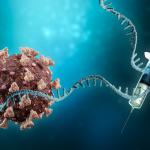Prognostic cell-based assay predicts acute cellular rejection in pre- and post-transplant testing...
Background and Purpose: Children with LTx demonstrate lower rejection-risk and immunosuppression requirements compared with ITx recipients. Accurate rejection-risk assessment could enable early minimization and reduced drug toxicity in either recipient type. Allospecific CD154+T-cytotoxic memory cells (CD154+TcM) predict rejection in small cohorts of pediatric LTx and ITx and require validation
Methods: Between 2006-2012, screening-validation testing of CD154+TcM was undertaken at our center under protocol NCT#01163578 in children <21 years who receive LTx or ITx. In this cell-culture-based test, donor-specific immune response is expressed as the ratio of donor- and third-party-induced CD154+TcM. The ratio is termed immunoreactivity index or IR. In general, an IR > 1 implies increased donor-specific immune response and increased risk of rejection.
Results: 218 children provided 283 samples for testing. Donor- or third-party-induced CD154+TcM did not exceed background in 37 samples from 23 children and were discarded (Poisson statistic). A screening cohort of 147 samples from 120 subjects was tested with research-grade reagents and flow cytometers. In this cohort, an IR ≥ 1.1 in 98 post-transplant samples predicted rejection within 60 days after a test with performance (performance metrics are sensitivity, specificity, positive predictive value, and negative predictive values) of 92%, 84%, 65%, and 97%, respectively (AUC 0.878). In 49 pre-transplant samples, an IR ≥1.23 predicted rejection within the first 60 days after LTx or ITx with performance of 80%, 71%, 74%, and 77%, respectively (AUC 0.820). A validation cohort of 99 samples from 71 children was tested with a standardized test format using cGMP-manufactured reagents and FDA-approved instruments. Performance of the abovementioned pre- and post-transplant rejection-risk thresholds for predicting rejection was replicated in the validation cohort. Specifically, test performance in 67 post-transplant samples was 84%, 81%, 64%, and 93%, respectively (AUC 0.792). Test performance in 32 pre-transplant samples was 54%, 89%, 78%, and 74%, respectively (AUC 0.848).
Conclusions: In screening-replication testing of pre-transplant and post-transplant blood samples, allospecific CD154+T-cytotoxic memory cells predict acute cellular rejection after liver or intestine transplantation with high sensitivity and specificity. This performance can permit safe minimization of immunosuppression if confirmed in multicenter testing.


